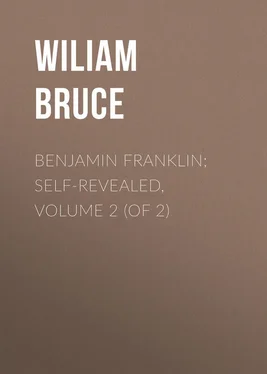Wiliam Bruce - Benjamin Franklin; Self-Revealed, Volume 2 (of 2)
Здесь есть возможность читать онлайн «Wiliam Bruce - Benjamin Franklin; Self-Revealed, Volume 2 (of 2)» — ознакомительный отрывок электронной книги совершенно бесплатно, а после прочтения отрывка купить полную версию. В некоторых случаях можно слушать аудио, скачать через торрент в формате fb2 и присутствует краткое содержание. Жанр: foreign_antique, foreign_prose, на английском языке. Описание произведения, (предисловие) а так же отзывы посетителей доступны на портале библиотеки ЛибКат.
- Название:Benjamin Franklin; Self-Revealed, Volume 2 (of 2)
- Автор:
- Жанр:
- Год:неизвестен
- ISBN:нет данных
- Рейтинг книги:4 / 5. Голосов: 1
-
Избранное:Добавить в избранное
- Отзывы:
-
Ваша оценка:
- 80
- 1
- 2
- 3
- 4
- 5
Benjamin Franklin; Self-Revealed, Volume 2 (of 2): краткое содержание, описание и аннотация
Предлагаем к чтению аннотацию, описание, краткое содержание или предисловие (зависит от того, что написал сам автор книги «Benjamin Franklin; Self-Revealed, Volume 2 (of 2)»). Если вы не нашли необходимую информацию о книге — напишите в комментариях, мы постараемся отыскать её.
Benjamin Franklin; Self-Revealed, Volume 2 (of 2) — читать онлайн ознакомительный отрывок
Ниже представлен текст книги, разбитый по страницам. Система сохранения места последней прочитанной страницы, позволяет с удобством читать онлайн бесплатно книгу «Benjamin Franklin; Self-Revealed, Volume 2 (of 2)», без необходимости каждый раз заново искать на чём Вы остановились. Поставьте закладку, и сможете в любой момент перейти на страницу, на которой закончили чтение.
Интервал:
Закладка:
It was while he resided here that Wygate, a fellow-printer, made a proposal to him that, if accepted, might have given a different direction to his career. Drawn to Benjamin, who had taught him how to swim, by common intellectual tastes, and by the admiration excited in him by Benjamin's vigor and agility as a swimmer, he suggested to the latter that they should travel all over Europe together, and support themselves as they went by the exercise of their handicraft. Benjamin was disposed to adopt the suggestion, but, when he mentioned it to his friend, Mr. Denham, upon whom he was in the habit of calling, the latter disapproved of it, and advised him to dismiss every thought from his mind except that of returning to Pennsylvania, which he was about to do himself. Nay more, he told Benjamin that he expected to take over a large amount of merchandise with him, and to open a store in Philadelphia; and he offered to employ Benjamin as his clerk to keep his books, when the latter had acquired a sufficient knowledge of bookkeeping under his instruction, copy his letters, and attend to the store. In addition, he promised that, as soon as Benjamin should have the requisite experience, he would promote him by sending him with a cargo of bread-stuffs to the West Indies, and would, moreover, procure profitable commissions for him from others, and, if Benjamin made a success of these opportunities, establish him in life handsomely. The proposal was accepted by Benjamin. He was tired of London, remembered with pleasure the happy months spent by him in Pennsylvania, and was desirous of seeing it again. He agreed, therefore, at once, to become Mr. Denham's clerk at an annual salary of fifty pounds, Pennsylvania money. This was less than he was earning at the time as a compositor, but Mr. Denham's offer held out the prospect of a better future on the whole to him.
After entering into this agreement, Benjamin supposed that he was done with printing forever. During the interval preceding the departure of Mr. Denham and himself for America, he went about with his employer, when he was purchasing goods, saw that the goods were packed properly for shipment, and performed other helpful offices. After the stock of goods had been all safely stored on shipboard, he was, to his surprise, sent for by Sir William Wyndham, who had heard of his swimming exploits, and who offered to pay him generously, if he would teach his two sons, who were about to travel, how to swim; but the two youths had not yet come to town, and Benjamin did not know just when he would sail; so he was compelled to decline the invitation. The offer of Sir William, however, made him feel that he might earn a good deal of money, were he to remain in England and open a swimming school, and the reflection forced itself upon his attention so strongly that he tells us in the Autobiography that, if Sir William had approached him earlier, he would probably not have returned to America so soon.
He left Gravesend for Philadelphia on July 23, 1726, after having been in London for about eighteen months. During the greater part of this time, he had worked hard, and spent but little money upon himself except in seeing plays and for books. It was Ralph who had kept him straitened by borrowing sums from him amounting in the whole to about twenty-seven pounds. "I had by no means improv'd my fortune," Franklin tells us in the Autobiography , "but I had picked up some very ingenious acquaintance, whose conversation was of great advantage to me; and I had read considerably." 7
After a long voyage, he was again in Philadelphia, and Keith was now a private citizen. When Benjamin met him on the street, he showed a little shame at the sight of his dupe, but he passed on without saying anything. Keimer seemed to have a flourishing business. He had moved into a better house, and had a shop well supplied with stationery, plenty of type, and a number of hands, though none of them were efficient.
Mr. Denham opened a store in Water Street, and the merchandise brought over with him was placed in it. Benjamin gave his diligent attention to the business, studied accounts, and was in a little while an expert salesman. But then came one of those sudden strokes of misfortune, which remind us on what perfidious foundations all human hopes rest. Beginning with his relations to Mr. Denham, Franklin narrates the circumstances in these words:
We lodg'd and boarded together; he counsell'd me as a father, having a sincere regard for me. I respected and loved him, and we might have gone on together very happy, but, in the beginning of February, 1726/7, when I had just pass'd my twenty-first year, we both were taken ill. My distemper was a pleurisy, which very nearly carried me off. I suffered a good deal, gave up the point in my own mind, and was rather disappointed when I found myself recovering, regretting, in some degree, that I must now, some time or other, have all that disagreeable work to do over again. I forget what his distemper was; it held him a long time, and at length carried him off. He left me a small legacy in a nuncupative will, as a token of his kindness for me, and he left me once more to the wide world; for the store was taken into the care of his executors, and my employment under him ended.
Franklin did have all that disagreeable work to do over again, for it was of a pleuritic abscess that he died in the end. Of Mr. Denham we cannot take our leave without drawing upon the Autobiography for an incident which shows that he was one of the many good men whose friendship was given so generously to Franklin. He was at one time a merchant at Bristol, and failed in business. After compounding with his numerous creditors, he migrated to America where he made a fortune in a few years. While he was in England with Benjamin, he invited his former creditors to an entertainment, and, when they were all seated, thanked them for the easy terms on which they had compromised their claims against him. Duly thanked, they supposed that there was nothing in store for them but the ordinary hospitality of such an occasion, but, when each turned his plate over, he found under it an order upon a banker for the full amount, with interest, of the unpaid balance of the debt that he had released.
At the time of Mr. Denham's death, Franklin had only recently arrived at the age of twenty-one. Holmes, his brother-in-law, now urged him to return to his trade, and Keimer offered him a liberal yearly wage to take charge of his printing-office, so that he himself might have more time for his stationery business. Franklin had heard a bad character of Keimer in London from Keimer's wife and her friends, and he was reluctant to have anything more to do with him; so much so that he endeavored to secure employment as a merchant's clerk, but, being unable to do so, he closed with Keimer.
I found in his house [says the Autobiography ] these hands: Hugh Meredith, a Welsh Pennsilvanian, thirty years of age, bred to country work; honest, sensible, had a great deal of solid observation, was something of a reader, but given to drink. Stephen Potts, a young countryman of full age, bred to the same, of uncommon natural parts, and great wit and humour, but a little idle. These he had agreed with at extream low wages per week, to be rais'd a shilling every three months, as they would deserve by improving in their business; and the expectation of these high wages, to come on hereafter, was what he had drawn them in with. Meredith was to work at press, Potts at book-binding, which he, by agreement, was to teach them, though he knew neither one nor t'other. John, – a wild Irishman, brought up to no business, whose service, for four years, Keimer had purchased from the captain of a ship; he, too, was to be made a pressman. George Webb, an Oxford scholar, whose time for four years he had likewise bought, intending him for a compositor, of whom more presently; and David Harry, a country boy, whom he had taken apprentice.
Читать дальшеИнтервал:
Закладка:
Похожие книги на «Benjamin Franklin; Self-Revealed, Volume 2 (of 2)»
Представляем Вашему вниманию похожие книги на «Benjamin Franklin; Self-Revealed, Volume 2 (of 2)» списком для выбора. Мы отобрали схожую по названию и смыслу литературу в надежде предоставить читателям больше вариантов отыскать новые, интересные, ещё непрочитанные произведения.
Обсуждение, отзывы о книге «Benjamin Franklin; Self-Revealed, Volume 2 (of 2)» и просто собственные мнения читателей. Оставьте ваши комментарии, напишите, что Вы думаете о произведении, его смысле или главных героях. Укажите что конкретно понравилось, а что нет, и почему Вы так считаете.










![Benjamin Franklin - Memoirs of Benjamin Franklin; Written by Himself. [Vol. 2 of 2]](/books/747975/benjamin-franklin-memoirs-of-benjamin-franklin-wr-thumb.webp)
![Benjamin Franklin - Memoirs of Benjamin Franklin; Written by Himself. [Vol. 1 of 2]](/books/748053/benjamin-franklin-memoirs-of-benjamin-franklin-wr-thumb.webp)
